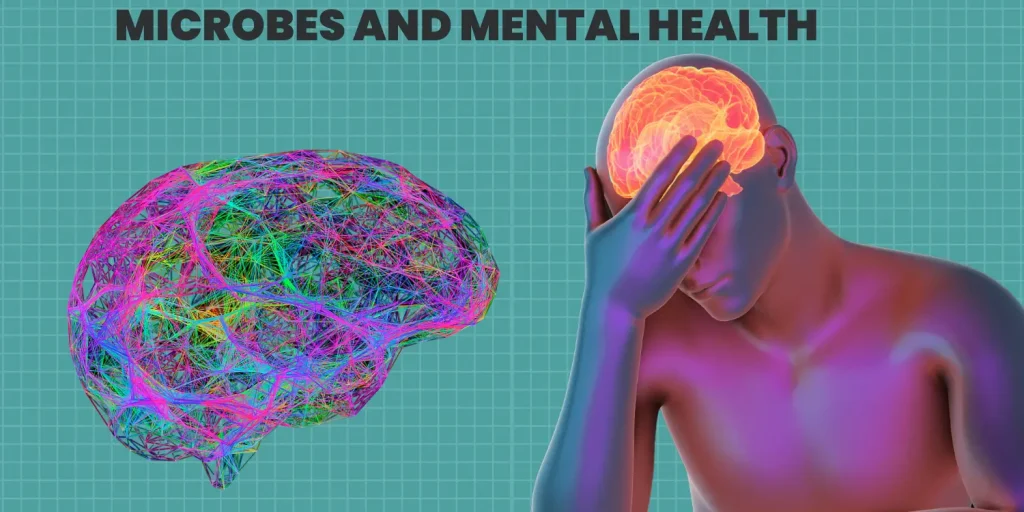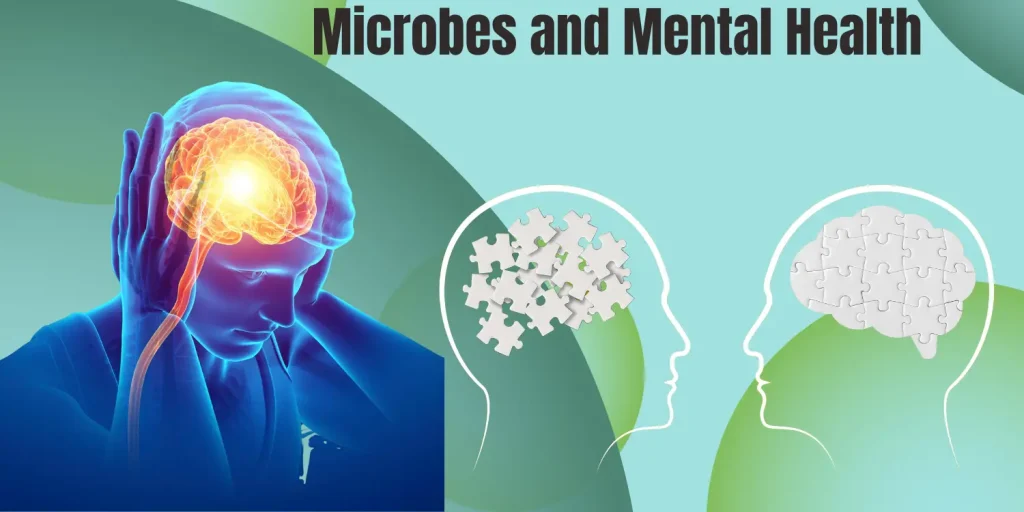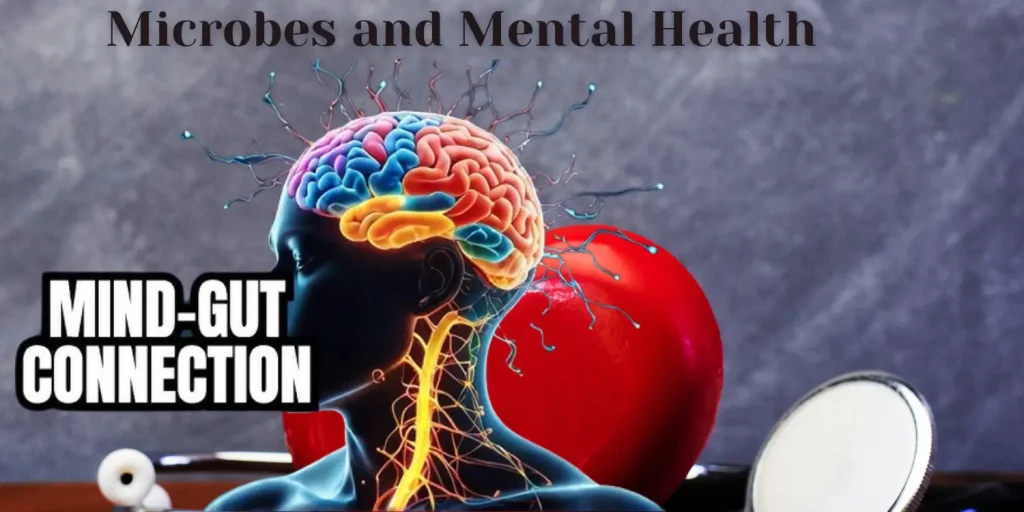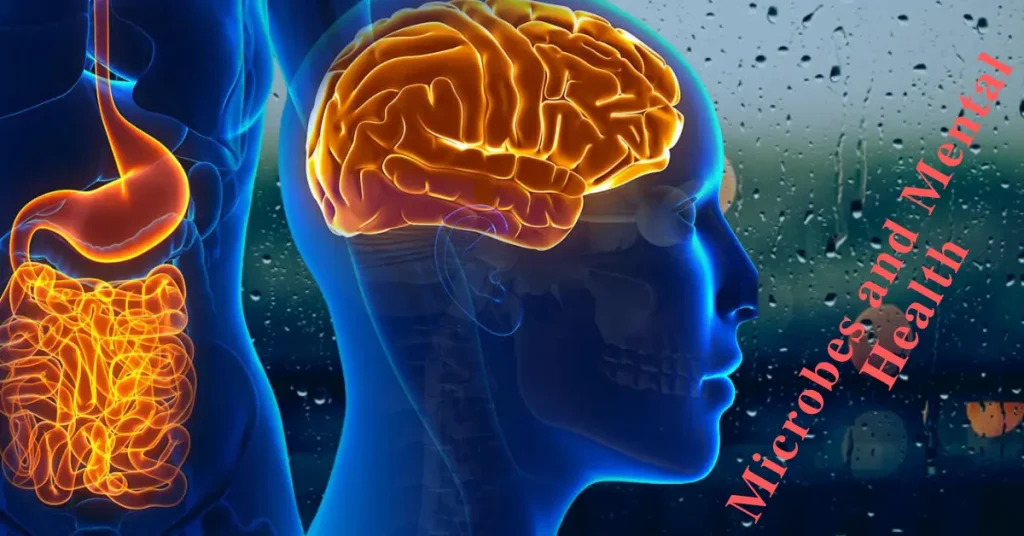Microbes and Mental Health: An Intriguing Connection
The human body hosts trillions of microorganisms called Microbes and Mental Health, and they reside in the mouth, gut, and skin and more other regions. Of all the microbiota present in the human body, gut microbiota has received a lot of attention because of the great effect it has of the Mental Health of an individual which is not limited to digestion. Current researches have shown an interconnection between intestinal flora and cognitive Mental Health which owes much to the Gut –Brain Axis concept. This two-way system can let microbial populations access the gastrointestinal tract and influence behaviour and brain function.
Many complex mechanisms, immunologic, hormonal and neural conduits, interconnect microbes and Microbes and Mental Health. The gut microbes biosynthesis neurons’ regulating hormones such as serotonin, metabolites like SCFAs, and other bioactive compounds capable of signaling the brain. Further, they are involved actively in regulation of inflammation, and the hypothalamic-pituitary-adrenal (HPA) axis which has specific correlation with mental health disorders such as anxiety, depressive disorders and stress related disorders.
Diet, geographical location, stress and antibiotic medications alter gut microbiota and have exhibited an impact on mental health. Several mental disorders including the major depressive disorder, schizophrenia and the autism spectrum disorders have been associated with dysbiosis – imbalances in gut microbiome. Therefore, microbial balance regaining interventions –such as probiotics, prebiotics and modifications of the diet are progressively being considered as possible ways through which ones Mental Health may be enhanced.
This relatively new science underlines such connections between the brain and small intestine microbiota, and it offers directions for understanding and managing mental disorders. 除了揭开更多科学的� Lahner@gmx.at veil, 研究微生物在精神健康中的角色提出了一种新的设想来提升精神健康水平。

Microbes and Mental Health: What Are They Used For?
Microbes include bacteria, fungus, viruses ,and any other microscopic living thing and these tiny organisms are very important to our lives in a number of ways. Scientists have only recently begin investigating the link between mental illness and the microbiome, the ecosystem of bacteria that exists within and on people. The scientific investigation of microbiome–gut–brain connections is now called psychobiotics.
Knowledge about which type of bacteria influence behavior and cognition is actually the purpose of the investigation of the relationship of bacteria and mental health. Linking such concepts has revealed that one of the several routes through which the gut communicates with the brain is known as the gut-brain axis. The GUT bacteria appears to manufacture compounds that affect mood, stress response, and neuronal activity including neurotransmitters and other bioactive molecules. Certain types of gut bacteria such as bacterium, turic, and bacteroides produces the mood altering neurotransmitter serotonin and influences the creation of other chemicals that regulate distress and depression.
Currently, researchers are researching the specifics of using food or probiotics, prebiotics, or even simply transplanting the faecal microbiome to treat people’s mental disorders. It is for this reason that people with one or multiple mental disorders such as anxiety or depression, erectile dysfunction or other disorders, diabetes, heart disease, autoimmune conditions, metabolic disorders or even obesity, have lower levels of good bacteria in their microbiome. This gap might, of course, be redressed with an impact on the overall Mental Health of the patient.
In anxiety, depression, and for autism spectrum disorders among other ailments, psychobiotics and other microbiome-based treatments are likely to be presented in the clinical setting as complementary treatments. Even though the concept is still largely unexplored, more and more data hints at the microbiome as a powerful tool for improving Mental Health and providing new approaches to the treatment of mental disorders.

How does it work Microbes and Mental Health?
As many researches show some wires which connect the gut’s content with the brain, bacteria for the Mental Health of the mind are needed. Scientifically it would not be wrong to say that each human body harbours several trillions of bacteria, viruses, fungi and other microorganisms residing in the gut and involved directly in immunologic functions and digestion as well as regulating balance of most physiological processes. By the way, the same microbes via the gut/brain connection also affect state of mind, behaivor and mood.
From ANS that little thick and lengthy reaches nearly everybody around the GBM, likewise the gut could reach the using head all the time as well as at anytime. One of them is when the brain and gut microbes choose to take their evaluation and product of review of a set of mental and status signals enthusiastically. For example, all the probiotics that live in each of us make the biochemicals serotonin and GABA, which are responsible for controlling moods.
However, studies note that the greater proportion of secreted serotonin is found in the gut, which thus houses more that 90% of this hormone. Hence, it is very important that one knows that any shift in the chemicals synthesized by the body inside the head introduced by a disruption in the balance of gut bacteria that affects the production of the chemicals synthesised creates mental ill health inclusive of anxiety and depression.
Moreover, the most recent research has clearly shown that these gut bacteria might even affect the human body’s reactions towards stress. Severity of stress reaction is determined by dysfunction of gut microbiota and schizophrenia, depression, and ptsd are examples of mood disorder stress. On the other hand, good microbiome assists an individual to handle stress because it is involved in moderating stress hormones for example cortisol.
However, they also contain some targets relevant for immunity other than immune and enterosynthetic properties of microbiota. Actually increasing internal microbiota may lead to inflammation and inflammation is correlated with several psychiatric disorders. Because inflammation is associated with depression, anxiety, and other cognitive disorders, trying to rectify the digestive system could benefit the brain.
Find out how certain treatments can affect the microbiome and mental health: probiotics, prebiotics and diet: a summary However, it should be noted that all of these interventions have one aim: to rebalance the bacterial flora and get the intestines back to work for the body, emotions, stress and productivity.
Finally, I do not wish to claim that, apart from karmic connection, germs, and Mental Health are linked in another way that might be as straightforward as one would like to see. It would help support the mind to give it the same importance as the body which would help us focus on mental health concerning the brain and the body’s microbiome.

How do microbes affect mental health?
Some of microbes are viruses, fungus, bacteria, and other microbes having furthermore implication on health, not only on the physical but also the mental condition of health. The group of microorganisms residing in the gut, referred to as gut microbiota, was described to influence many aspects of mental health in recent decades. The ‘gut-brain axis’, a relatively recent branch of study that focuses on the bidirectional communication between the stomach and the brain, reveals how healthy and unhealthy microbiota may affect our moods, behaviors, ability to think, learn, remember, and even develop an illness or mental disorder.
The immune and enteric nervous systems plus the CNS form part of the complex which is referred to as the gut-brain axis. The SCFAs are the main active compounds secreted by the gut microbiota that in turn can interact with the brain by using immunological signaling molecules and neurotransmitters. For example, some neurotransmitters such as serotonin which is commonly referred too as the ‘feel good’ factor is synthesized by gut bacteria. Serotonin is said to be synthesized mainly in the bowels, and fluctuations of the same arising from dysbiosis of microbiota may lead to anxiety and or depression.
In addition, the composition of the microbial communities with immunomodulatory potential influences the brain through the alteration of immune system. In the stomach, microbiota communicates with the immune system and the immune cells that then manage inflammation in the brain and other portions of the body. Some of the mental disorders that have been associated with chronic inflammation include; Autism spectrum disorders, schizophrenia, and depression. Research has shown that dysbiosis together with an altered microbial environment, enhances the degree of inflammation that affects how the brain can function and get to develop mental disorders.
Studies have also revealed that antibiotics, infection or other factors that disrupt the commensal microbiota result in Mental Health disorders. Modifying the gut microbiome influence behaviour and manage the emotions in humans and animals as well. For instance, the mice which were germ-free, meaning they had no gut bacteria, reacted with anxiety and depression to specific gut bacteria. Other evidence for a critical role of the microbiome in mental health has been obtained from the report that faecal material transfer between humans alters behaviour and mood in patients with mental disease.
Moreover, learning ability and the probability of neurodegenerative diseases are associated with gut microbiota. However, further research is needed in order to fully establish these connections; some existing research suggests that an imbalance of microbiota within an individual can be a contributing cause for conditions such as Parkinson’s disease or Alzheimer’s disease.
Consequently, microbes –in particular, those living in the gut—play an important role in maintaining mental health. The microbiome modulates inflammation and function of the immunologic system as well as synthesis of neurotransmitters along the gut-brain bar- rel which impact mood, behaviour and cognition. From anxiety and depression, as well as depression, neurodegenerative disorders have also been associated with such a state as dysbiosis, which directly affects the microbiota. Some of the microbiome-based treatments that may offer fresh strategies for the prevention and cure of mental health diseases that the increase in this research field will open up for include the following: probiotics, diet modification as well as faecal transplants.

How do microbes affect the brain?
One can no longer doubt that bacteria play an essential role in how the human brain works and how psychologically well people are. New study has cleared the clarity of the dangerous idea ,concentrating on recently established gut-brain axis as a communication link between head and the stomach. This link opens up the question of whether gut bacteria may have an impact on behaviour or at least on brain function.
It is estimated that the human gut contains over a ten trillion bacteria and fungi plus viruses and other pathogens. These bacteria have an impact on digestion, immunity and metabolism. However, they are not only within the stomach alone. The nerve that enables signals to be passed from the gut to the brain and from the brain to the gut is called the vagus nerve. In addition, an enteral microbiome synthesizes neurobiologically active substances that circulate in the systemic blood including serotonin and some metabolites that are SCFAs.
Microorganisms are one of the main functions among all the exogenous factors that can influence the synthesis of neurotransmitters. Some researchers believe that the gut actually produces quite a lot of serotonin, which people think has some link with mood instability. Depression is a result of an imbalanced microbiota that determines the amounts of serotonin in the brain and regulates the pathways of its activity. The mental illnesses which have an association with gut bacteria or microbiome are ASD, anxiety, and depression.
In addition to serotonin, signalling chemical gamma-aminobutyric acid, which lowers anxiety levels and slows brain activity, has been found in the gut bacteria. Similarly, it is proving the correlation between the gut and the mind as well as the potential of altering the mouse gut microbiota to affect the bible GABA signalling in the brain.
Microorganisms effects on the brain are also controlled by autoimmunity with the CNS being the most affected. The immune systems are modulated by the gut microbiota, and it could be that an incorrect balance of microbes is the source of this illness. Inflammation has been found to worsen diseases of mental health such as Alzheimer’s, Parkinsonism, and schizophrenia. Chronic inflammation may also affect learnt, remembered, cognitive, and emotional regulatory abilities.
Also, and perhaps even more interesting are the links that may exist between the gut bacteria and the shape or the activity of the brains. It (gut microbes) is admitted that early colonization with microbes found to be essential for proper brain development and therefore any change of this context around the brains must in one way have an effect on brains. Studies on the animal subjects have shown that an early colonizing microbiota in the developing creature may affect its cerebral functions and behaviours later on and which the behaviour of the animals is changed with the microbial composition.
Even the diet consumed in this regards influences the likelihood of this correlation. This means that the variety of the organisms that reside in our gut are determined and defined be our diets. Fibre, for example, promotes the growth of the healthy bacteria that produce SCFAs have, anti-inflammatory and cognitive functions. The microbiota is inhibited, and the conditions of mental health worsen if there are nutrient-poor diets and if the diets high in processed foods and sweets are provided.
As a result, some aspects and some nuances of the warfare between microbes and the brain may be defined. It interacts with behavior and cognition, as well as other processes including neurotransmitter biosynthesis, immune system command, and brain remodeling. Since the actual presence of these organisms can directly lead to cures, then this enlarges the scope of action for therapists managing a plethora of neurological and psychiatric disorders.

How do microbes affect our behaviour?
It is clear that microbes and microorganisms including bacterias, viruses, fungus, and protozoa play a keystone role in our lives for healthy and pathologic conditions. But recently, a relationship between bacteria in the gut and the behavior of an individual has been discovered, meaning they may influence how we think, feel and act. The main approach applied to study this connection is presented by the gut-brain axis, which represents a bidirectional communication between the gut microbiota and the central nervous system.
One way through which bacteria affect behaviour involves making neurotransmitters. Four players implicated in mood and emotion manufactures in the GI tract also are synthesizable by gut bacteria; Lactobacillus and Bifidobacterium which are represented by three neurotransmitters; serotonin, dopamine, gamma-aminobutyric acid (GABA) serotonin. It is believed that some 90% of the body’s serotonin is made in the gut which means that changes in the balance of the good and bad microbes can affect levels of serotonin and the occurrence of conditions such as sadness and anxiety.
Another hormone, the immune system, plays a crucial role in linking microorganisms to behaviour also is relevant. Impairments in gut microbiota is regarded to be a reason for inception of inflammatory response. Many mental illnesses including Autism spectrum disorder, schizophrenia and depressive disorders have associated with chronic inflammation. The influence of the gut bacteria on neurosignaling clearly speculates that a healthy microbial balance is important for a healthy mind, at least in part because of modulating inflammation.
One of such aspect is how gut bacteria impact the stress response . Research shows that person with a diverse gut microbiome tends to be less stressed than those who have an imbalanced microbiome and may have increased feelings of anxiety. For instance, studies have found that mice given birth by a mother who lacks the normal complement of gut bacteria respond differently from the animal’s normal stress profile. The source material looks at how these mice’s stress-related behaviour is manageable when they are populated with certain bacterium.
More over, changes in crucial cognitive function such as memory and learning abilities have been associated with microbial dysbiosis. There are some SCFAs, including butyrate that are created from specific gut bacteria that have been proven to boost cognitive function and brain fitness. Diseases like Alzheimer’s, or even cognitive flaws, can be worsened because of disturbances in microbiome.
In conclusion, bacteria influence the chemistry of the brain and the immune system, stress reactions and other cognitive processes that have a wholesale impact on behaviour. As more is learnt on the mechanisms between these links, we may be able to identify other ways of promoting mental health through food, probiotics or other microbiome-targeting drugs.

How to get a Microbes and Mental Health from online?
A special approach should be applied to accumulate reliable and informative materials on the web to further research the links between microbes and mental health. You can use this guide to help you with your research:
1. Identify Reliable Sources
Therefore, the first approach should be to look for publications within academic journals and academic websites. Look for resources like:
• Scientific Journals: In order to find the scientific publications on microbiome and mental health, the researcher used such resources as Pubmed, Google Scholar, Science Direct which are the database for scientific articles. Some Google terms include such as ‘gut-brain axis,’ ‘gut microbiota and the brain,’ or ‘microbiotical regulation of mood.’
• Websites of universities: A large number of learning establishments produce and disseminate psychological and microbiological work. The other tip is to only consider article from university recognized to be producing research in the field, such as Harvard, Stanford or Oxford university.
• Trustworthy Health Websites: There are numerous reports and articles that can be found on the Web today in such professional sources as the National Institutes of Health (NIH), WebMd, Mayo Clinic, etc.
2. Advantages of Distance Learning Course
That is, some sites are free webinars, which offer free online courses: Coursera and edX.
Available microbiology, psychology, or Neuroscience Programs that explain the link between germs and mental health are often available in FutureLearn.
3. Join appropriate of scientific societies
Engage in online forums and communities like: • Reddit: Microbiology, psychology and neuroscience: Psychobiotics – the link between the gut and the brain – may classified under either psychology or microbiology subreddits.
• ResearchGate: This network as well enables you engage with interact with researchers and gain the published articles on your topic, which might give you a better understanding of the topic.
4. Continue to read the blogs, and more articles.
From this review of this topic, it will become apparent that the human brain is influenced by microbiota, a fact that most science and health blogs would reveal. Sometimes the author provides the reader with more information on recent studies concerning the particular problem in question at ScienceAlert, Psychology Today, or The Microbe Blog.
It is possible to learn a lot and be in tune with a relatively short-sighted connection between microbes and mental health using these strategies.

Microbes and Mental Health Conclusion?
In conclusion, new data regarding microbes and mental health offer great new opportunities to study the brain-gut axis. Bacteria in the human body, but more particularly in the gut, are critically involved in determining the behaviour and moods of individuals as well as their capacity to think. This involves the gut to brain signal through the vagus nerve, via the immune system and through metabolic products like neurotransmitters, but it is a microbiome of bacteria, fungi and other microorganisms. By maintaining a balanced amount of helpful microorganisms, it was suggested in this communication that mental health can be greatly affected.
Dysbiosis, or disturbances in the gut microbiotics have been linked to mental health conditions, including anxiety, melanchololy and autism spectrum disorder. Also there have been positive indications that probiotics, prebiotics and some specific dietary changes that foster microbial rich gut can have positive effect on mood and alleviate the signs of mental health diseases. However, further work needs to be done to analyse all the processes involved and to develop the treatments based on microbiome alteration.
While the subject of microbiome and mental health is relatively new, it in fact paints a broader picture of mental health and tackles the interconnections between the gut, the brain, and overall health. It also stresses how decisions in our daily lives including what the individuals eat, amounts of stress, and even sleep are key parameters that impact on mental health in a manner dictated by balance of microbial occurrence. Many details could be untangled regarding how certain strains of bacteria can help in healing and preventing mental illnesses as more studies are conducted, hence coming up with novel solutions.
